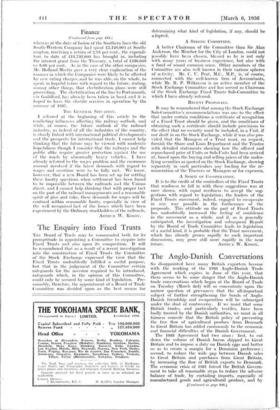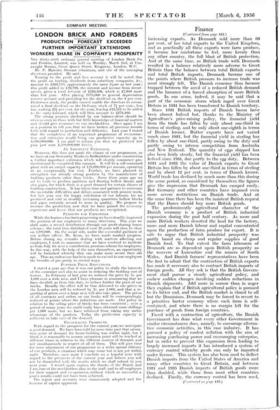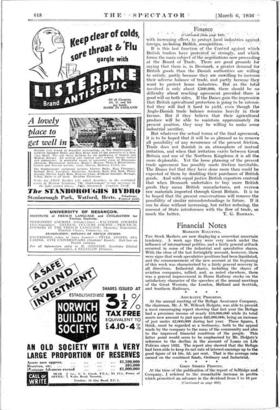The Anglo-Danish Conversations
So disappointed have many British exporters become with the working of the 1933 Anglo-Danish Trade Agreement which expires in June of this year, that there seems to be some danger that the Anglo-Danish trade conversations which began at the Board of Trade on Tuesday (March 3rd) will so concentrate upon the narrow question of grievances that the all-important subject of further strengthening the bonds of Anglo- Danish friendship and co-operation will be submerged under the dust of controversy. If we insist that sonic British trades, and particularly textiles, have been badly treated by the Danish authorities, we must in all fairness concede that the British policy of preventing the free flow of agricultural produce from Denmark to Great Britain has added enormously to the economic and financial difficulties of the Danish Government.
The 1933 Agreement had two aims : first, to cut down the volume of Danish bacon shipped to Great Britain and to impose a duty on Danish eggs and .butter so as to create a margin for a Dominion preference ; second, to reduce the wide gap. between Danish sales to Great Britain and purchases from Great Britain, by increasing the flow of British exports to Denmark. The economic crisis of 1931 forced the British. Govern- ment to take all reasonable steps to reduce the adverse balance of trade, by surtailing imports, especially of manufactured goods. and agricultural produce, and by (Continued on page 446.) Finance
(Continued from page 444.) _ .
increasing exports. As Denmark sold more titan GO per cent. of her total exports to the United Kingdom, and as practically all these exports were farm produce, it became her misforttine to feel, more keenly than any other country, the full blast of British protection. And at the same time, as -British trade with Denmark resulted in a balance relatively more adverse to Great Britain than the balance between total British exports and total British- imports, Denmark became one of the points where British pressure to increase trade was most strongly felt. The Danish economy thus became trapped between the anvil of a reduced British demand and the hammer of a forced absorption of more British goods. In one sense, indeed, it may be said that a part of the economic storm which raged over Great Britain in 1931 has been transferred to Danish territory.
Since 1931 British imports of Danish bacon have been almost halved but, thanks to the Ministry of Agriculture's price-raising policy, the financial yield from the trade has fallen 'by only about one-third in terms of sterling, and by only about one-eighth in terms of Danish kroner. Butter exports have not varied much since 1931, but the financial yield in sterling has fallen by about one-third, partly owing to the duty and partly owing to intense competition from Australia and New Zealand. The quantity of eggs shipped has also been fairly steady, but the financial yield has been halved since 1931, due partly to the egg duty. Between 1931 and 1935 the value of Danish exports to Great Britain has fallen by about one-third in terms of sterling and by about 12 per cent. in terms of Danish kroner. World trade has declined by much more than this during the same period, so considered by themselves the figures give the impression that Denmark has escaped easily. But Germany and other countries have imposed even more severe restrictions on Danish trade. And at the same time there has been the insistent British request that the Danes should buy more British goods.
The predominantly agricultural character of the Danish economy is a product of British industrial expansion during the past half century. As more and more British workers deserted the land for the factory, more and more Danish labOur and capital concentrated upon the production of farm produce for export. It is safe to argue that British industrial prosperity was partly based on cheap and regular supplies of good Danish food. To that extent the farm labourers of Denmark are as dependent upon British prosperity as the weavers of Lancashire and the miners of South Wales. And Danish farmers' representatives have been the first to admit that the contraction of British exports has made it necessary also to contract British imports of foreign goods. All they ask is that the British Govern- ment shall pursue a steady agricultural policy, and eschew sudden changes involving sudden reductions in Danish shipments. And more in sorrow than in anger they explain that if British agricultural policy is pursued to its bitter end, and the British market is closed to all but the Dominions, Denmark may be forced to revert to a primitive barter economy where each farm is self- contained, and where there is no margin left for the purchase of goods from foreign countries. Faced with a contraction of agriculture, the Danish Government has done what every other Government in similar circumstances does, namely, to encourage alterna- tive economic activities, in this case industry. It has pursued a policy of modest reflation with the aim of increasing purchasing power and encouraging enterprise, but in order to prevent this expansion from leading to largely increased imports it has introduced a system of currency control whereby goods can only be imported under licence. This system has also been used to deflect Danish imports from the United States of America and mammy other countries to Great Britain, and between 1931 and 1935 Danish imports of British goods more than doubled, while those from most other countries declined. Finally, the currency control has been used,
(Conlin-red Ors page 448.)
Finance
,
(commit* from Page
with increasing effect, to proteetlocal industries against.. foreign; including British, eosnlietition.: - • 1: It is this last function of the Control against which British traders have protested so' strongly, and which forms the main subject of the negotiations now proceeding at the Board of Trade. There are good grounds for saying that there is, in Deninark, a greater demand for British goods than the Danish authorities are willing to satisfy, partly- -because they are unwilling to-increase their adverse balance"of trade, and partly because they want to protect home industries. But as the total involved is only about £500,000, there should be no difficulty about• reaching agreement -provided - there is good will on both sides. If the Danes gain:the impression British agricultural protection is going to be intensi- fied they will find it hard to yield, even though the Anglo-Danish trade balance remains heavily in their favour. But if they believe that their agricultural produce will be able to maintain approximately its present position, they may be willing to make some industrial sacrifice.
But whatever • the actual terms of the final agreement, it is to be hoped that it will be so phrased as to remove all possibility of any recurrence of the present friction. Trade does not flourish in an atmosphere of mutual irritation, and when that irritation exists between Great' Britain and one of the Northern Kingdoms it is all the more deplorable.. Yet the loose phrasing of the present trade agreement has possibly made friction inevitable. The Danes feel that they have done more than could be expected of them by doubling their purchases of British goods. And with equal justice British exporters contend that When Denmark undertakes to buy more British. goods they mean • British manufactures, not oversee raw materials imported through Great Britain: It is to be hoped that the present conversations will remove the possibility of similar misunderstandings in futUre. If it can be done without increasing, but rather reducing, the amount of State interference with the flow of trade, so


















































 Previous page
Previous page